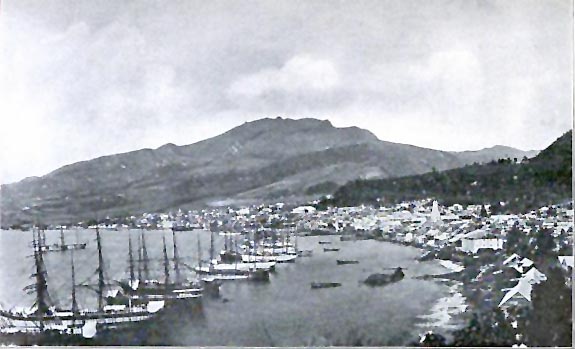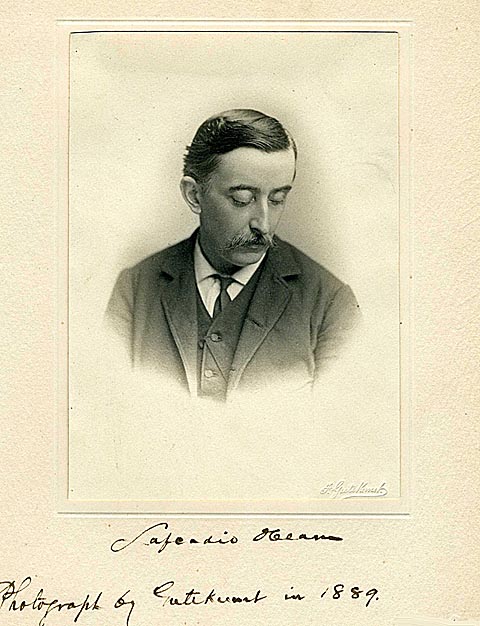PREVIOUS: AMERICA
THE WEST INDIES
ST. PIERRE, MARTINIQUE 1889 -1890
In 1889 Harper's sent Hearn to the West Indies as a correspondent, where he wrote "Two Years in the French West Indies" and "Youma, The Story of a West-Indian Slave" (both 1890)
.

Martinique, St. Pierre and Mt. Peleé, 1890.
Hearn's novella "Two Years in the West Indies" is dedicated to
A mon cher ami,
LEOPOLD ARNOUX
Notaire a Saint Pierre, Martinique.
Souvenir de nos promenades, de nos voyages, de nos
causeries, des sympathies echangees, de tout le charme
d'une amitie inalterable et inoubliable, de tout ce qui parle
a Tame au doux Pays des Revenants.
Written for his Harper's assignement, it is one of his lesser stories, giving way to "Youma, the Story of a West-Indian Slave"
For a complete text see:
Lafcadio Hearn, "Two Years in the French West-Indies," 1922
YOUMA THE STORY OF A WEST-INDIAN SLAVE 1890
The end of Youma defending her beloved Mayotte in a black uprising, (p. 186)
... "Then Youma could not make herself
heard : a fresh outburst of vociferation
drowned her voice. But her reproaches
had struck home in at least one direction:
she had touched and stirred the smouldering
contempt, the secret jealous hate
of the black for the freedman of color;
and the mulatto's discomfiture was hailed
by yells of ironical laughter.
In the same
moment there was a violent pushing and
swaying ; - some one was forcing his way
to the front through all the pressure, -
rapidly, furiously, - smiting with his elbows,
battering with his shoulders : a
giant capre ....
He freed himself, and
sprang into the clear space before the
flaming building, - making his cutlass
flicker about his head, - and shouted: -
"Nou pa ka brile negresse!...."
The mulatto put to scorn advanced and
would have spoken ; - ere he could utter a
word, the travailleur, with a sudden backward
blow of his unarmed hand, struck
him to the ground. -
"A moin! me/otie!" thundered the
tall new-comer ; - "Stand by me, brothers ! -
we do not burn negresses ! "
And Youma knew it was Gabriel who
stood there alone, - colossal, menacing,
magnificent, - daring the hell about him
for her sake -
"Ni raison! ni raison!" responded
numbers .... "Non ! nou pa ka brile negresse ! ....
Chache lechelle"
Gabriel had
forced sympathy, - wrung some sentiment
of compassion from those wild-beast
hearts "Pote lechelle vini! - if i yon
lechelle!" was clamored through the crowd
a ladder! - a ladder!
Five minutes, - and a ladder touched
the window. Gabriel himself ascended it, -
reached the summit, - put out his iron
hand. Even as he did so, Youma, stooping
to the sill, lifted Mayotte from behind
it.
The child was stupid with terror ; - she
did not know him. -
"Can you save her?" asked Youma, —
holding up the little fair-haired
girl.
Gabriel could only shake his head; -
the street sent up so frightful a cry -
"Non ! - non ! - non ! - non ! - -pa le
yche-b'ek'e ! - janmain yche-b'eke!" -
"Then you cannot save me !" cried
Youma, clasping the child to her bosom, -
"Janmain ! janmain, mon ami!" -
"Youma, in the name of God " -
"In the name of God you ask me to
be a coward ! - Are you vile, Gabriel ? -
are you base ? Save myself and leave
the child to burn?.... Go!" -
"Leave the b'eke's yche ! - eave it ! -
leave it, girl !" shouted a hundred voices. -
"Moin!" cried Youma, retreating beyond
the reach of Gabriel's hand, -
"moin !
Never shall I leave it, — never ! I shall
go to God with it." -
"Burn with it, then !" howled the negroes,
"down with that ladder ! down
with it, down with it !"
Gabriel had barely
time to save himself, when the ladder
was dragged away. All the first fury of
the riot seemed to have been rekindled by
the sight of the child ...."
Excerpted from
Lafcadio Hearn, "Yuma", 1922

Hearn's famous portrait, probably taken for Elizabeth in New York in 1889.
NEW YORK 1890
Upon Hearn's return from the West Indies in 1890 Japan was looming large on the oriental horizon. A book by Percival Lowell, entitled "The Soul of the Far East" had just appeared. It apparently made a profound
impression upon Hearn. Harper's, the publishers, came to the conclusion that it would be expedient to send one of their staff to Tokyo
as regular correspondent. Harper's had just published Hearn's stories "Chita" and "A Midsummer Trip," to enthusiastic public acclaim.
Needless to say, Hearn eagerly accepted the offer. It was arranged, that he was to leave for the Far East in the beginning of March 1890.
Little did Hearn realise that the strange land for which
he was bound was to keep him forever, to make him
one with its religion, its institutions, its nationality, and
that, as he closed the door of the publisher's room that
day, he was closing the door between himself and western
civilisation forever.
Excerpted from "Lafcadio Hearn" by Nina Kennard, 1913.
NEXT: JAPAN-KAMAKURA


